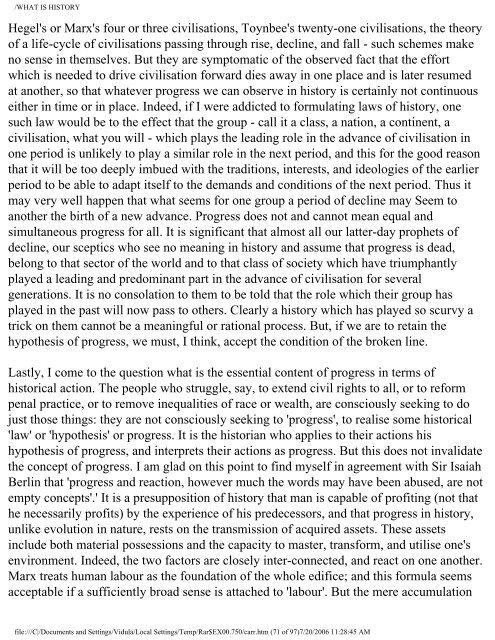What is History / by Edward Hallett Carr - Universal History Library
What is History / by Edward Hallett Carr - Universal History Library
What is History / by Edward Hallett Carr - Universal History Library
Create successful ePaper yourself
Turn your PDF publications into a flip-book with our unique Google optimized e-Paper software.
WHAT IS HISTORY<br />
Hegel's or Marx's four or three civil<strong>is</strong>ations, Toynbee's twenty-one civil<strong>is</strong>ations, the theory<br />
of a life-cycle of civil<strong>is</strong>ations passing through r<strong>is</strong>e, decline, and fall - such schemes make<br />
no sense in themselves. But they are symptomatic of the observed fact that the effort<br />
which <strong>is</strong> needed to drive civil<strong>is</strong>ation forward dies away in one place and <strong>is</strong> later resumed<br />
at another, so that whatever progress we can observe in h<strong>is</strong>tory <strong>is</strong> certainly not continuous<br />
either in time or in place. Indeed, if I were addicted to formulating laws of h<strong>is</strong>tory, one<br />
such law would be to the effect that the group - call it a class, a nation, a continent, a<br />
civil<strong>is</strong>ation, what you will - which plays the leading role in the advance of civil<strong>is</strong>ation in<br />
one period <strong>is</strong> unlikely to play a similar role in the next period, and th<strong>is</strong> for the good reason<br />
that it will be too deeply imbued with the traditions, interests, and ideologies of the earlier<br />
period to be able to adapt itself to the demands and conditions of the next period. Thus it<br />
may very well happen that what seems for one group a period of decline may Seem to<br />
another the birth of a new advance. Progress does not and cannot mean equal and<br />
simultaneous progress for all. It <strong>is</strong> significant that almost all our latter-day prophets of<br />
decline, our sceptics who see no meaning in h<strong>is</strong>tory and assume that progress <strong>is</strong> dead,<br />
belong to that sector of the world and to that class of society which have triumphantly<br />
played a leading and predominant part in the advance of civil<strong>is</strong>ation for several<br />
generations. It <strong>is</strong> no consolation to them to be told that the role which their group has<br />
played in the past will now pass to others. Clearly a h<strong>is</strong>tory which has played so scurvy a<br />
trick on them cannot be a meaningful or rational process. But, if we are to retain the<br />
hypothes<strong>is</strong> of progress, we must, I think, accept the condition of the broken line.<br />
Lastly, I come to the question what <strong>is</strong> the essential content of progress in terms of<br />
h<strong>is</strong>torical action. The people who struggle, say, to extend civil rights to all, or to reform<br />
penal practice, or to remove inequalities of race or wealth, are consciously seeking to do<br />
just those things: they are not consciously seeking to 'progress', to real<strong>is</strong>e some h<strong>is</strong>torical<br />
'law' or 'hypothes<strong>is</strong>' or progress. It <strong>is</strong> the h<strong>is</strong>torian who applies to their actions h<strong>is</strong><br />
hypothes<strong>is</strong> of progress, and interprets their actions as progress. But th<strong>is</strong> does not invalidate<br />
the concept of progress. I am glad on th<strong>is</strong> point to find myself in agreement with Sir Isaiah<br />
Berlin that 'progress and reaction, however much the words may have been abused, are not<br />
empty concepts'.' It <strong>is</strong> a presupposition of h<strong>is</strong>tory that man <strong>is</strong> capable of profiting (not that<br />
he necessarily profits) <strong>by</strong> the experience of h<strong>is</strong> predecessors, and that progress in h<strong>is</strong>tory,<br />
unlike evolution in nature, rests on the transm<strong>is</strong>sion of acquired assets. These assets<br />
include both material possessions and the capacity to master, transform, and util<strong>is</strong>e one's<br />
environment. Indeed, the two factors are closely inter-connected, and react on one another.<br />
Marx treats human labour as the foundation of the whole edifice; and th<strong>is</strong> formula seems<br />
acceptable if a sufficiently broad sense <strong>is</strong> attached to 'labour'. But the mere accumulation<br />
file:///C|/Documents and Settings/Vidula/Local Settings/Temp/Rar$EX00.750/carr.htm (71 of 97)7/20/2006 11:28:45 AM







